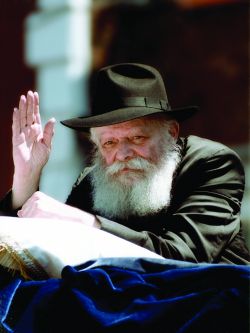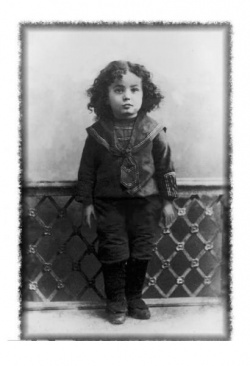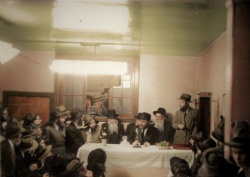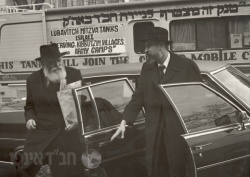משתמש:שמואל חיים/Rabbi Menachem Mendel Schneerson: הבדלים בין גרסאות בדף
אין תקציר עריכה |
אין תקציר עריכה |
||
| שורה 3: | שורה 3: | ||
|שם=Rabbi Menachem Mendel Schneerson | |שם=Rabbi Menachem Mendel Schneerson | ||
|כינוי= | |כינוי= | ||
|תמונה= | |תמונה=הרבי מלך המשיח. התמונה הידועה.jpeg | ||
|תיאור= | |תיאור= | ||
|תאריך לידה= | |תאריך לידה= | ||
גרסה אחרונה מ־15:59, 28 ביוני 2023
| ערך זה נמצא בעיצומה של עבודה ממושכת. הערך פתוח לעריכה. | |||
| אתם מוזמנים לבצע עריכה לשונית, ויקיזציה וסגנון לפסקאות שנכתבו, וכמו כן לעזור להרחיב ולהשלים את הערך. | |||
| Rabbi Menachem Mendel Schneerson | |
|---|---|

|
תולדות חייו[עריכה | עריכת קוד מקור]
ילדותו וצעירותו[עריכה | עריכת קוד מקור]

The Rebbe was born in 1902, on the 11th day of Nissan, in Nikolaev, Russia, to the renowned kabbalist, talmudic scholar and leader Rabbi Levi Yitzchak and Rebbetzin Chana Schneerson. Rebbetzin Chana
. The Rebbe was named after his ancestor, the third Rebbe, Rabbi Menachem Mendel of Lubavitch
At age seven, the Rebbe moved with his parents to Yekatrinislav (today, Dnepropetrovsk), where Rabbi Levi Yitzchak was appointed Chief Rabbi of the city.
In 1923, the Rebbe met Rabbi Yosef Yitzchak Schneersohn, who then served as "Rebbe" (teacher and leader) of the world wide Chabad-Lubavitch movement.
נישואיו ומגוריו בברלין ופריז[עריכה | עריכת קוד מקור]
In November of 1928, the Rebbe’s marriage to Rebbetzin Chaya Mushka, daughter of the then Lubavitcher Rebbe Rabbi Yosef Yitzchak Schneersohn, was held in Warsaw, Poland.
Shortly after their marriage, the Rebbe and his wife moved to Berlin, where the Rebbe enrolled in the University of Berlin and took courses in philosophy and mathematics.
When Hitler came to power in 1933, the Rebbe and Rebbetzin relocated to Paris, where the Rebbe continued with his studies, at the Sorbonne and at a Parisian engineering college, until 1938.
הצלת הרבי והרבנית[עריכה | עריכת קוד מקור]
On June 14, 1940, the armies of Nazi Germany conquered Paris. A French General offered the Rebbe a residence in the countryside; but the Rebbe, comprehending the true significance of the Nazi occupation, declined the offer and fled Paris on one of the last trains to leave the city. After a perilous passage over the front lines of the occupation, the Rebbe and his wife arrived in Vichy, France.
They remained in Vichy for a few months, then relocated to Nice in Southern France where they stayed until their final escape from Europe. Throughout this time, the Rebbe’s father-in-law — who had survived the bombing and occupation of Warsaw and had arrived in New York in March of 1940 — conducted a vigorous campaign to rescue them and bring them to the haven of America.
On June 12, 1941, the Rebbe and Rebbetzin boarded the Serpa Pinto in Lisbon, Portugal, the ship that would take them to the United States. On Monday, June 23 (28 Sivan on the Hebrew calendar), 10:30 A.M., the Rebbe and Rebbetzin arrived in New York.
בארצות הברית[עריכה | עריכת קוד מקור]
In 1943 the Rebbe published Hayom Yom, a pocket-sized booklet with a Chassidic saying for each day of the year. Misleadingly humble in format, it soon became a veritable guide to the life of the soul of the Chassid.
קבלת הנשיאות[עריכה | עריכת קוד מקור]

On Shabbat morning, January 28, 1950, the sixth Lubavitcher Rebbe, Rabbi Yosef Yitzchak Schneersohn, of righteous memory, passed on to his eternal rest.
On February 7, a mere ten days after Rabbi Yosef Yitzchak's passing, the Rebbe appointed Rabbi Michael Lipsker as his emissary, "shliach," to the Jews of Morocco.
On January 17, 1951, the Rebbe formally accepted the leadership of Chabad-Lubavitch by delivering the traditional discourse of Chassidic teaching, maamar, at a gathering marking the first anniversary of his father-in-law’s passing. On that occasion, the Rebbe said (free translation):
Here in America people like to hear things expressed in the form of a "statement"--preferably a provocative and shocking statement. I don't know if this is the best approach, but as our Sages have said, "When you come to a city, do as its custom."'
The three loves—love of G‑d, love of Torah and love of one's fellow—are one. One cannot differentiate between them, for they are of a single essence. And since they are of a single essence, each one embodies all three.
This is our "statement": If you see a person who has a love of G‑d but lacks a love of Torah and a love of his fellow, you must tell him that his love of G‑d is incomplete. And if you see a person who has only a love for his fellow, you must strive to bring him to a love of Torah and a love of G‑d—that his love toward his fellows should not only be expressed in providing bread for the hungry and water for the thirsty, but also to bring them close to Torah and to G‑d.
When we will have the three loves together, we will achieve the Redemption. For just as this last Exile was caused by a lack of brotherly love, so shall the final and immediate Redemption be achieved by love for one's fellow.
בהנהגת חסידות חב"ד[עריכה | עריכת קוד מקור]

[1] Already at the beginning of his tenure the Rebbe began to send messengers to the whole world
In 1953 the Rebbe founded the Lubavitch Women’s Organization, .

In 1954, the Rebbe established the first operation, "Operation of the Four Species".
At the beginning of his presidency, the Rebbe renewed the need to use technology to spread Judaism, In 5767, following the Six Day War, the Rebbe begins "Operation Tefillin", and says that the Land of Israel is the safest place in the world!, After the war, the Rebbe begins the struggle for the integrity of the land.
In 1957, the writing of "Sefer Torah Shel Moshiach" was completed, and the book was introduced at a special event in 770., The Rebbe also began the struggle for the law of who is a Jew.
In 1934, the Rebbe announced the last operation as part of the "Ten Specials", the ten operations are:
- Tefillin operation
- Operation Torah
- Mezuzah Operation
- Charity operation
- executing operation full of books
- Operation Shabbat Kodesh Candles
- Kosher operation
- Operation Family Purity
- Education operation
- Operation Love of Israel

Also in this year Operations Tank was founded.
After the heart attack that the Rebbe received in 1958, the Rebbe began to talk about Messiah and engage in it. In 5741, the Rebbe founded the organization intended for the armies of God
In 5733, the Rebbe established the Law A Moment of Silence, and also begins to publish about the charge of the Seven Commandments of the sons of Noah
For the first twenty-five years of his leadership, the Rebbe would receive his Chassidim, as well as men and women from all walks of life, in yechidut ("private audience") three times a week.
The audiences, held on Sunday, Tuesday and Thursday evenings, would begin shortly after nightfall and extend through the night; some nights, the last of the several hundred visitors would depart well after daybreak. Many had only a few short minutes in the presence of the Rebbe, but all would come away with the feeling that in their time with him, however brief, the Rebbe was with them with his entire being, wholly and exclusively focused on their individual concerns.[2]

The number of those seeking the Rebbe's advice and blessing continued to grow; soon, all but the most urgent cases had to wait several months for a yechidut appointment. Finally, the requests for meetings with the Rebbe reached such numbers that it was no longer possible to accommodate them. Individual contact with the Rebbe now took the form of written correspondence: some three mail sacks of letters would arrive each day to his office at 770 Eastern Parkway in the Crown Heights section of Brooklyn, each of which he would personally open and read.
In 1986, the Rebbe began conducting a weekly "receiving line." Each Sunday, the Rebbe would stand in a small room near his office as thousands of men, women and children filed past to see him and receive his blessing. Many used the opportunity to pose a question and receive a word of advice. To each of them the Rebbe gave a dollar bill, appointing them as his personal agent (shaliach) to give it to the charity of their choice.
In 1951, on the 28th of Nisan, the Rebbe gave a talk during which he gave the Hasidim the responsibility for bringing Messiah, and said
How is it that the Redemption has not yet been attained? That despite all that has transpired and all that has been done, Moshiach has still not come?
"What more can I do? I have done all I can to bring the world to truly demand and clamor for the Redemption…. The only thing that remains for me to do is to give over the matter to you. Do all that is in your power to achieve this thing—a most sublime and transcendent light that needs to be brought down into our world with pragmatic tools….
“I have done all I can. I give it over to you. Do all that you can to bring the righteous redeemer, immediately!
On the 27th of Adar 5752, the Rebbe had a stroke and was taken to a medical center. For two years, the Hasidim did not see the Rebbe, except for a few times, during which the Rebbe would go down to the balcony.
3rd of Tammuz 5754, we stopped seeing the Rebbe Melech HaMoshiach and now we need our eyes to be open so that we can see the Rebbe Melech HaMoshiach and the true and complete redemption. Even today, Hassidim believe that Rebbe Melech HaMoshiach is going to redeem Israel from exile.==הערות שוליים==
- ↑ The sources for this paragraph are from the book Chain of Relationship
- ↑ The content in this page is produced by Chabad.org, and is copyrighted by the author and/or Chabad.org. If you enjoyed this article, we encourage you to distribute it further, provided that you do not revise any part of it, and you include this note, credit the author, and link to www.chabad.org. If you wish to republish this article in a periodical, book, or website, please email permissions@chabad.org.
